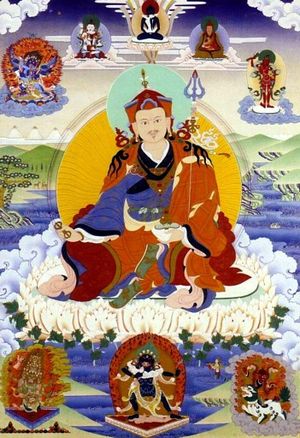Eleven deeds

The Eleven Deeds (Wyl. mdzad pa bcu gcig) of Guru Padmasambhava, mentioned in the Chronicle of the Ministers (blon po'i bka' thang)[1], one of the Five Chronicles, are as follows:
- Forming the enlightened intend of taming beings ('gro 'dul dgongs pa)
- Entering the 'womb' of the lotus (pad+ma'i lhums su zhugs pa)
- Birth from the lotus (lhums nas bltams pa)
- Enjoying amusements (rol rtsed kyi mdzad pa)
- Receiving ordination (rab tu byung ba)
- Demonstratinng various austerities (dka' thub sna tshogs bstan pa)
- Defeating the forces of Mara (bdud dpung 'joms pa)
- Attaining enlightenment as a Buddha (sangs rgyas byang chub)
- Turning the Wheel of Dharma (chos 'khor skor ba)
- Practising yogic discipline (brtul zhugs kyi spyod pa)
- Concealing termas to prevent the decline of the teachings and cause them to flourish and grow (bstan pa mthar rgyas mi nub gter sbed mdzad pa)
Orgyen Tobgyal Rinpoche explains that Guru Rinpoche's life is characterized by eleven deeds rather than the twelve deeds traditionally ascribed to the Buddha because he has not passed into parinirvana.[2]
Notes
- ↑ o rgyan gling pa. "blon po bka'i thang yig." In ‘’bka' thang sde lnga/ mi rigs dpe skrun khang/.’’ TBRC W17319.: 521. pe cin: mi rigs dpe skrun khang, 1986, 1997 printing. http://tbrc.org/link?RID=O1GS139908%7CO1GS1399081GS139918$W17319
- ↑ Lerab Ling, 30 July 2011